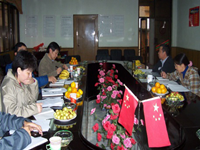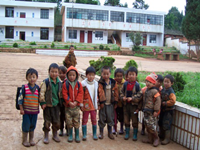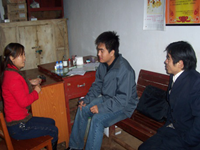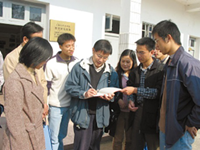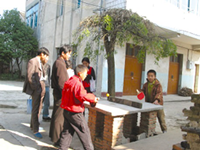Research is one of the core activities at CHEDS. Since our conception in 2005, we have constantly been engaged in a number of different projects, both independently and in collaboration with other agencies. The section below is intended to provide a brief overview of our recent and ongoing research projects. It is not exhaustive, instead it is more of a cross-section, representing our involvement in issues ranging from rural health to the environment, from education to regional economics. If you have any further questions about any of our research activities, please contact us.
1. Rural Health Service Research Project
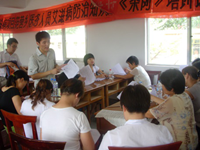
- Using material from on-site surveys in eight counties across four different provinces (Jiangsu, Shandong, Sichuan and Henan) this project studied aspects of health service-provision in rural areas: the operations of health institutions in the 3-level (county, township, village) rural health system, health resources, and service products. At the same time, it also studied the health status of the rural population and how rural patients seek medical aid. The study was especially concerned with the establishment of an improved 3-level rural health services network, a problem that it approached from the perspective of government expenditure methods, incentive mechanisms, supply and demand etc. The on-site research was funded by the China Primary Health Care Foundation. On the basis of their extensive research, the project group intends to explore new models for the creation of a 3-level healthcare system, concentrating in particular on the reform of township hospitals and health institutions.
2. Maternal and Child Health Service Funding Research project
The objective of this study was to analyze government funding of maternal and child health services, and from this analysis to formulate and propose new government policies for strengthened funding. These proposals will ensure that maternal and child health services are sufficiently funded, that the allocation of resources is sensible and fair and that their utilization is effective, thereby providing the public with a comprehensive, universally accessible and affordable maternal and child health services “package”. The study was therefore not merely concerned with the amount of government funding; it also raised proposals relating to system reforms, so that the funds may be used in ever fairer, ever more effective, ever more beneficial ways. By posing the question of how the government can offer practical support to maternal and child health services, this study aimed to provide pragmatic policy suggestions to the relevant government departments. It was funded by UNICEF and the Ministry of Finance Social Security Department and carried out in two separate stages.
Besides research staff from CHEDS itself, the project group also included members of the Ministry of Science and Technology, as well as students and academic staff from Tsinghua University, Renmin University, Nanjing University, Southeast University, Nanjing University of Finance and Economics, Anhui University and Kunming Medical University. The first stage of the study was launched in seven counties across three different provinces in October 2007, whilst the second stage took place in eight counties across four different provinces during April 2008.
3.Human Resources in Rural Health Care Institutions
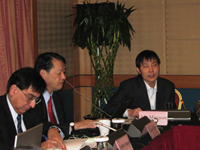
- This study is a collaborative project between CHEDS, the Ministry of Health’s Health Human Resources Development Center and the Department of Public Health, Oxford University. Through thorough research of the issues relating to the supply and demand of health personnel in rural China, it aims to elaborate proposals for the further development of health human resources in rural areas. The whole project is scheduled to take place in several phases. The final objective of this project is to provide an appropriate number of technically and professionally qualified medical staff to work in rural areas of China, so that the ever-increasing health service demands of the rural population may be satisfied. This project was funded by the China Medical Board (CMB) during its first stage, the second stage is being funded by Canada’s International Development Research Centre (IDRC).
4.Wujiang Human Development Project
The purpose of this project has been to survey and evaluate the development of Wujiang city since the founding of China from a human development perspective. It has studied the harmonious development of the economy and other aspects of social life and summarized the grassroots development of society. Professor Minquan Liu carried out two separate stages of the Wujiang Project in May 2003 and May 2004, with aid from the Ford Foundation. During the first stage of the project, the research team mainly studied the mutual relationships between Wujiang’s economic development and its education system, medical care development, income distribution, gender differences, and the environment. In the second stage the research remit was expanded to take account of other important aspects of economic and social development, including the economy, education, health, environment, gender, public governance, inequity, and human security. The Wujiang project laid the foundation for the establishment of CHEDS thanks to the variety of activities that went into achieving it, such as document collection and review, investigation and data collection, theory and survey research, translation and introduction to classic works on human development, as well as external communication and cooperation and the construction of a research team.
5.Research on Eco-compensation Mechanisms for Chishui Drainage, Guizhou

- Within the framework of public governance, this project analyzed the issue of environmental governance with respect to the Chishui River in Guizhou province. It explored the structural dynamics of existing
- environmental stakeholders and the formulation and execution mechanisms of environmental policies in order to evaluate the performance of public environmental governance. Our research team cooperated closely with the local environmental protection departments, combining the experience of environmental information-sharing and environmental stakeholder dialogue that has been carried out in China by the World Bank. A system of environmental information-sharing and stakeholder dialogue has now been set up in the Chishui River region, and suggestions for improvement will be proposed after evaluating the effects of this framework of public governance. This project was funded by the Asian Development Bank (ADB).
6.Editing:International Poverty Reduction Briefing
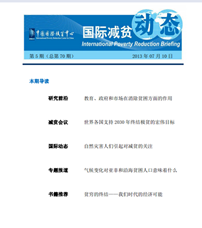
- This publication aims to collect the frontier theories, cases and new ideas that are related with poverty reduction. Each issue is generally comprised of 20-24 pages, saying about 20,000-25,000 characters. You may find them in the following address: http://www.iprcc.org.cn/front/article/catalog.action?id="30 The project is cooperated with International Poverty Reduction Center in China (IPRCC) and founded by China International Center for Economic and Technical Exchanges (CICETE).
-
Rural health service project: members of CHEDS carrying out surveys in Fanying.
Human resources in rural health care institutions: a preparatory meeting for the study.
Research on Eco-compensation Mechanisms for Chishui Drainage, Guizhou: a river in Guizhou.
International Poverty Reduction Briefing
